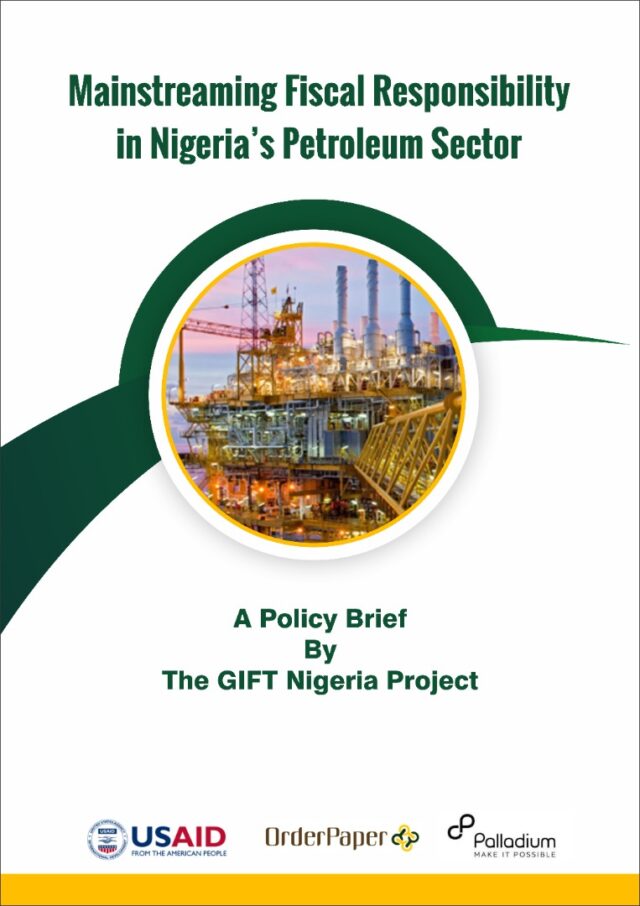Chairman of the Fiscal Responsibility Commission (FRC), Mr. Victor Muruako, has said that applying the provisions of the Fiscal Responsibility Act (FRA), 2007, in Nigeria’s extractive industry will bring about accountability, transparency and efficiency in the sector.
Mr. Muruako said given the vital place of the petroleum industry which remains a major foreign exchange earner and revenue source for the country, it is imperative that fiscal and accountability gaps be addressed using the FRA.
The FRC chairman made these remarks in a goodwill message at the public presentation of a research report on Mainstreaming Fiscal Responsibility in Nigeria’s Petroleum, held in Abuja.
The research report, conducted by OrderPaper Advocacy Initiative (OAI) and its partners in the Growth Initiatives for Fiscal Transparency (GIFT) Nigeria Project, was published to advance advocacy for fiscal and financial prudence in the affairs of the petroleum sector.
The GIFT Nigeria Project is designed to spearhead reforms around Transparency, Accountability and Good Governance (TAGG) as it relates to Nigeria’s petroleum sector.

The FRC Chairman, who was represented at the occasion by the Commission’s Head of Legal and Investigations Directorate, Barr. Charles Abana stressed that the project was timely and valuable especially at this material time when the country is challenged in every aspect of governance, particularly in the areas of revenue generation.
“As we are all aware, our beloved country is seriously challenged in virtually every aspect/level of governance, but particularly in the area of revenue generation. Revenue targets & projections in our Annual Budgets are hardly realized year-on-year. This, coupled with the fact that our ever-increasing debt servicing obligations, which has kept our Debt-to-Revenue ratio at a very uncomfortable level – have combined to keep the nation’s revenue situation in a critical condition,” he said
“Also, it has become clear that to keep the country from sliding into an undesirable state of being in an economic ICU and financial meltdown in the similitude of Sri Lanka, every effort must be made to end the opacity, inefficiency & ineptitude in Nigeria’s petroleum sector and we, as a people, must be collectively determined to manage our petroleum resources and their value chain in a transparent and accountable manner and for the benefit of all – beginning from fully mainstreaming rules-based fiscal responsibility principles and practices in the implementation of the Policies, Reforms and Governance Structures contained in the Petroleum Industry Act (P.I.A, 2021), while also strengthening the present F.R.A, 2007 through the passage of the amendment Bill now pending at the National Assembly.”
“It is instructive for us to note that part of the functions of the Commission as laid out in Section 3(1) of the Fiscal Responsibility Act, 2007 is to “undertake fiscal and financial studies, analysis and diagnosis and disseminate the result to the general public” as well as to disseminate such standard practices that will result in greater efficiency … and transparency (amongst others) in fiscal matters. There is, therefore, no gainsaying the fact that this noble research would invariably provide an invaluable tool for the enhancement of transparency, accountability and efficiency in the petroleum sector, which is very commendable and we join all and sundry in saluting and congratulating the GIFT Nigeria Project and the cluster partners for this laudable achievement.”
Muruako further hailed the effort of the GIFT’s implementing cluster group led by OrderPaper Advocacy Initiative as a highly acclaimed invaluable project which will go a long way in sanitizing the country’s extractive industry.
The project, according to the organisers of the event, is “aimed at reducing corruption in the sector, increase revenue remittances to government coffers by state entities, and promote efficient and effective service delivery by the government.”
